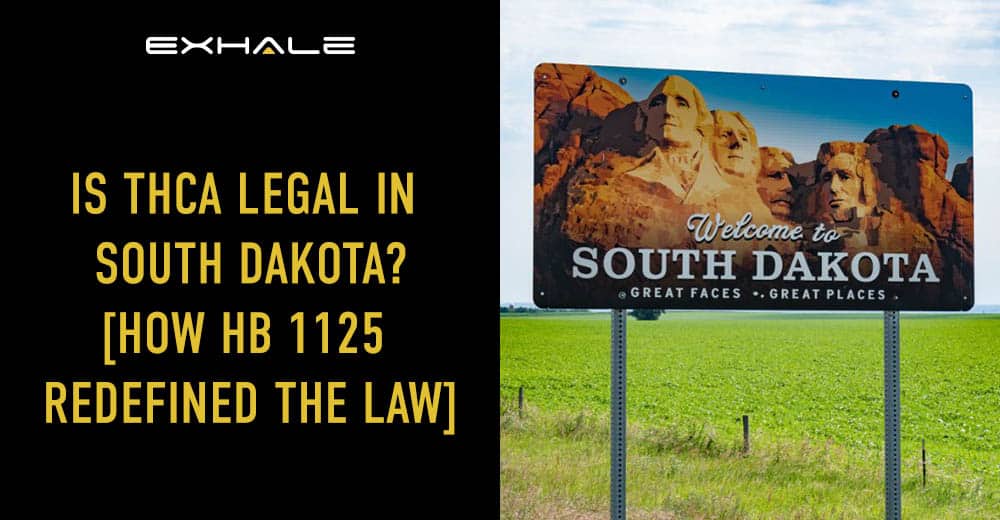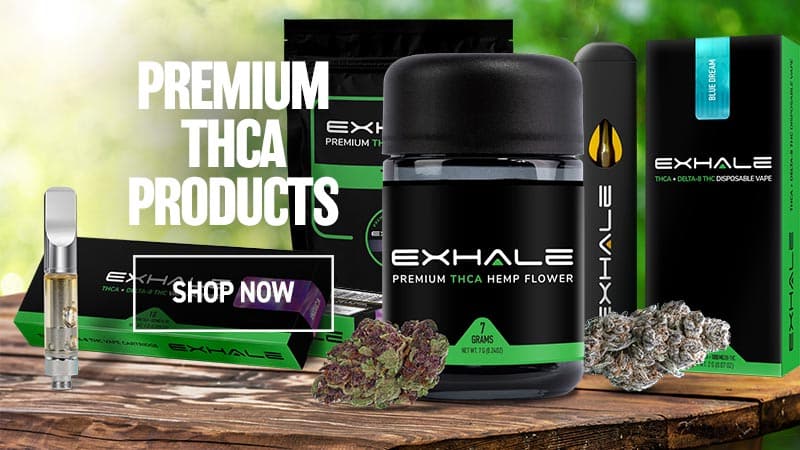If you’ve been curious about cannabis and its many compounds, you’ve probably heard of THCa. It’s a lesser-known cannabis plant cannabinoid, and it’s gaining attention for its potential benefits. However, understanding whether THCa is legal can be tricky, especially because the legal landscape surrounding cannabis is still evolving. South Dakota has had a complicated relationship with cannabis. This leaves many people wondering: Is THCA legal in South Dakota?
To answer that question, we need to examine the specifics of THCa, South Dakota’s cannabis laws, and how federal regulations play a role. Whether you’re a South Dakotan exploring your options or just someone curious about cannabis, this guide will help you navigate the legalities and make informed decisions about THCa in the Mount Rushmore State.
Understanding THCa
Before we get into the legal stuff, let’s start with the basics: What is THCa, and what can it do? THCa (Tetrahydrocannabinolic Acid, THCA, THC-a, and THC-A) is a non-euphoric cannabinoid found in raw and live cannabis plants. Unlike THC (Delta 9 THC, Delta 9, D9 THC, or D9), which is known for its euphoric effects, THCa doesn’t get you buzzed.
THCa is the acidic precursor to THC. When cannabis is heated (like when you smoke or vape it), non-euphoric THCa undergoes a process called decarboxylation, thereby converting it into euphoric THC.
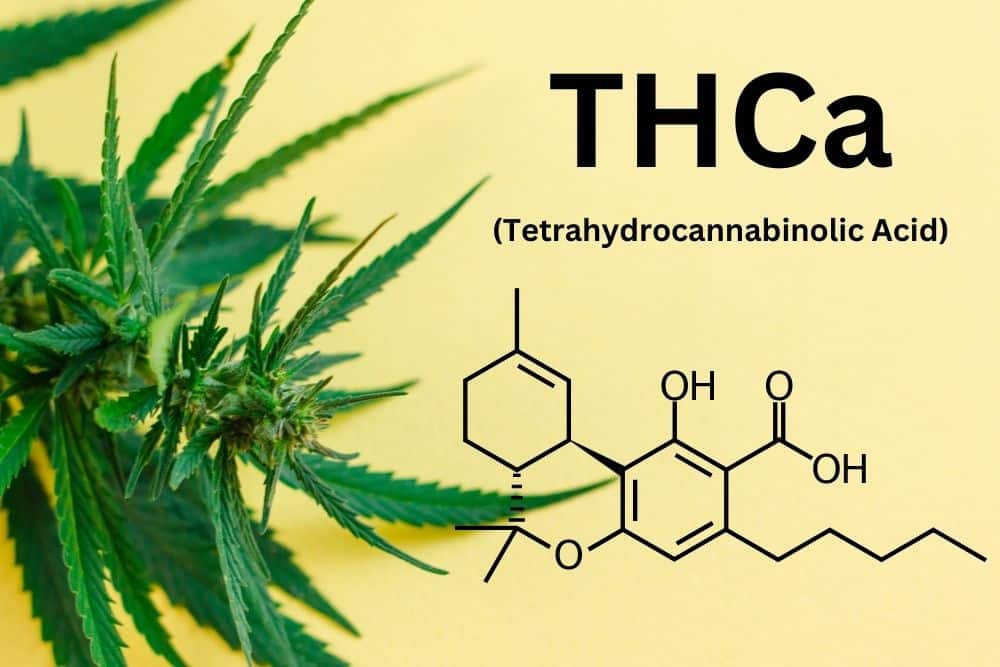
THCa is gaining attention for its potential therapeutic benefits when consumed in its natural, pre-heated state. Known for its natural benefits, this compound supports relaxation, balance, and overall well-being, making it a popular choice for wellness seekers. However, research is still in its early stages. More studies are needed to fully understand its effects. Despite its potential, THCA’s legal status is a gray area in many states, including South Dakota. The issue? THCa’s ability to convert into THC raises questions about its legal status.
So, where does South Dakota land on THCa legality? Let’s find out below.
Is THCa Legal in South Dakota?
As of this writing, hemp-derived THCa products are currently unclear in South Dakota. This vague nature of THCa legality in South Dakota stems from House Bill 1125 (HB 1125), which was passed by the state legislature and signed into law by Governor Kristi Noem.
HB 1125 took effect on July 1, 2024, and prohibited the sale and production of intoxicating products from hemp plants. Efforts by advocates to halt its implementation through last-minute appeals proved unsuccessful, as a judge declined to block the law. HB 1125 specifically targets cannabinoids like Delta 8, known for its psychoactive properties, thereby closing loopholes that might have allowed products containing these cannabinoids to be sold legally.
THCa, in its natural form, is non-psychoactive but can convert to THC when exposed to heat. While legislation focuses on chemically modified or converted hemp products, it does not explicitly address naturally occurring THCa in hemp.
However, the broad language of the bill suggests an intent to regulate hemp-derived products that may have intoxicating effects. As a result, individuals and businesses working with THCa products in South Dakota should proceed with caution and seek legal guidance to ensure compliance with state laws.
HB 1125 reflects South Dakota’s strict stance on cannabis derivatives with potentially intoxicating effects. While the 2018 federal Farm Bill legalized hemp and hemp-derived products containing 0.3% THC or less, many states have taken a more restrictive approach—South Dakota being one of them.
As a result, producing, selling, or possessing hemp-derived THCa products in South Dakota may be illegal due to their potential to convert to THC. However, since THCa occurs naturally in hemp and is rarely synthesized through cannabinoid modification, HB 1125 may not apply. This leaves THCa in a potential gray area unless specifically addressed by state lawmakers.
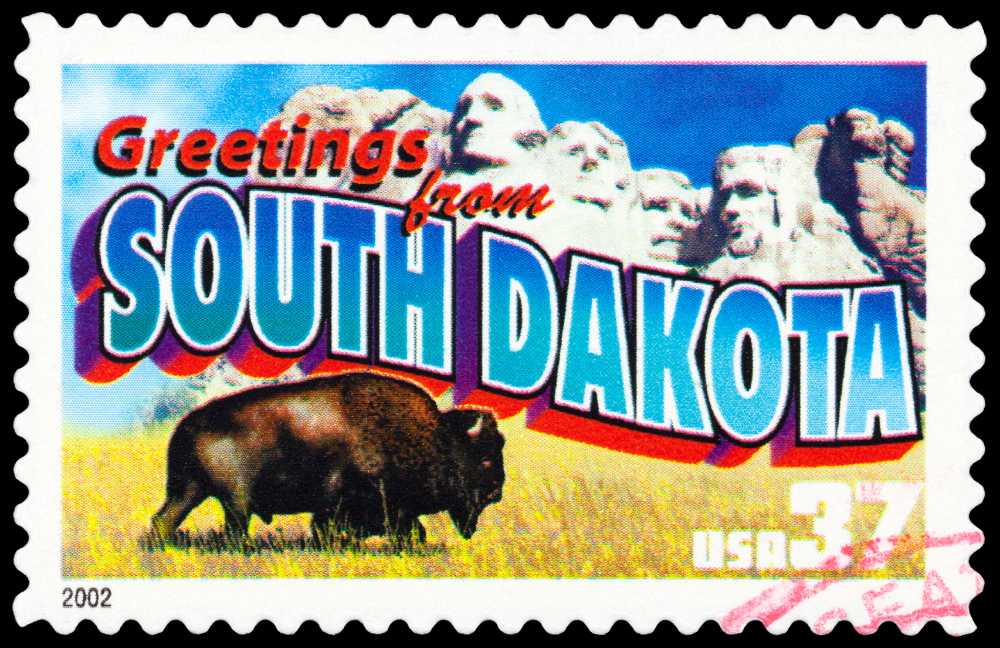
Cannabis Laws in South Dakota
South Dakota’s cannabis laws are a mix of progress and restriction. Let’s break it down for you.
Medicinal Cannabis Laws
In 2020, South Dakota voters approved Measure 26, which legalized medical cannabis for registered patients with debilitating medical conditions. This was a big step forward for the state, but the program is tightly regulated. All patients must obtain a medical cannabis card and can only purchase cannabis products from licensed dispensaries.
Recreational Cannabis Laws
While medical cannabis is legal, recreational cannabis is not. South Dakota voters approved a recreational cannabis measure in 2020, but the state Supreme Court later overturned it, ruling that it violated the state constitution’s single-subject rule. As of now, possessing or using cannabis for recreational purposes is illegal in South Dakota. A similar initiative, Measure 29, was put on the ballot in 2024, which failed with an overwhelming “no” vote.
South Dakota House Bill 1008 (2020)
South Dakota House Bill 1008 (HB1008), passed in 2020, legalized industrial hemp cultivation, production, and transport. This bill aligned state regulations with the 2018 Farm Bill and opened the door for hemp-derived cannabinoids like THCa.
By establishing a regulatory framework and funding for oversight, House Bill 1008 allowed farmers to explore new markets, including raw hemp flower high in THCa, which converts to THC when heated. This legislation positioned South Dakota to participate in the expanding hemp industry, giving consumers access to federally compliant products while ensuring regulatory control over production and distribution.
South Dakota House Bill 1125 (2024)
In 2024, South Dakota introduced House Bill 1125 (HB 1125), and it caused quite a stir. This bill is all about cracking down on certain hemp-derived products. It specifically targets cannabinoids like Delta 8 THC, Delta 9 THC, and Delta 10 THC, which are made by chemically changing hemp-derived CBD (Cannabidiol). These products can give you a “high” similar to regular marijuana, and lawmakers are worried about their safety and how they’re being sold.
House Bill 1125 passed and went into effect on July 1, 2024. The law bans the production, sale, and distribution of these chemically modified cannabinoids in South Dakota. This shook things up for the hemp industry and for people who use these products; the bill classified the production or sale of these hemp plant derivatives as a misdemeanor. Violators could face up to one year in jail, a hefty $2,000 fine, or both.
South Dakota’s HB 1125 is part of the state’s effort to keep up with the fast-changing world of cannabis and hemp. However, the law showcases just how tricky it can be to regulate something that’s constantly evolving.
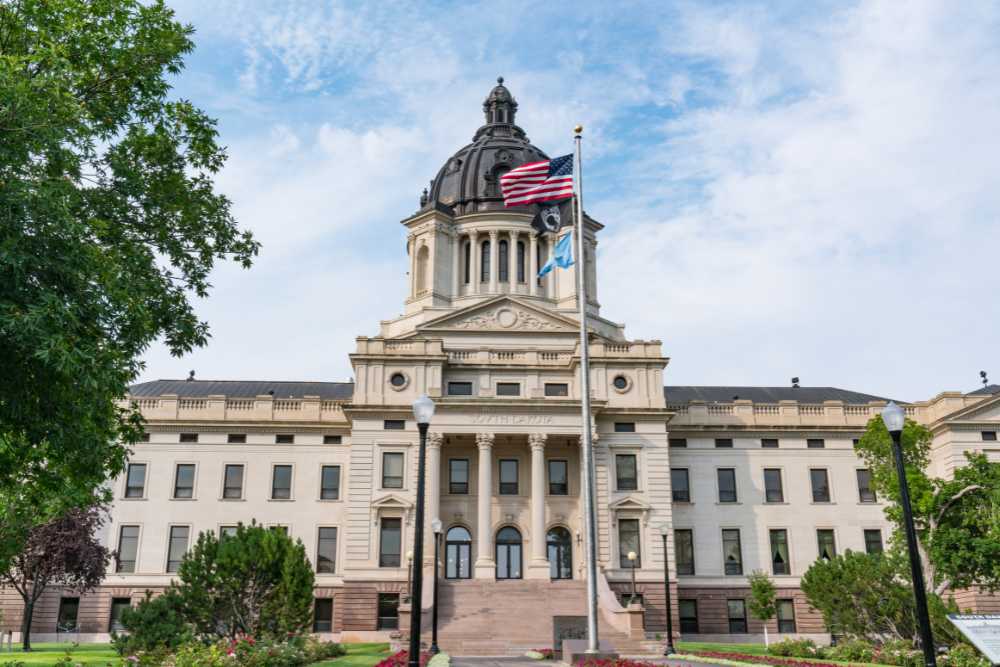
Understanding THCa’s Legality in South Dakota
To understand whether THCa is legal in South Dakota, we need to examine both state and federal laws. Let’s examine the laws as they relate to THCa, South Dakota, and the federal government.
State Cannabis Laws
South Dakota law defines cannabis as any part of the marijuana plant, including its seeds and resin. THC is explicitly listed as a controlled substance, but THCa is not mentioned. THCa exists in a legal gray area when it comes to hemp plants because it occurs naturally and is not chemically modified, yet HB 1125 bans all chemically modified intoxicating cannabinoids.
Many feel the law does not apply to THCa because the cannabinoid is non-euphoric and naturally occurs in high amounts in cannabis flower, particularly THCa hemp flower. Growers intentionally breed this flower to naturally produce high amounts of THCa without any chemical modification of other cannabinoids. However, since THCa can convert into psychoactive THC when heated, it may fall under existing cannabis regulations as established in HB 1125.
Since THCa is not explicitly addressed in the law, its legal status in South Dakota remains uncertain. This makes it extremely important for consumers to exercise caution when purchasing THCa hemp products.
Federal Legal Framework
Marijuana is still classified as a Schedule I controlled substance by the federal government. However, the 2018 Farm Bill legalized hemp plants and hemp-derived products as long as they contain less than 0.3% THC on a dry weight basis. This means hemp-derived THCa products are legal under federal law if they meet this criterion. But state laws may differ.
Distinction Between THCa and THC
One of the key factors in THCa’s legality is its non-euphoric nature. Unlike THC, THCa doesn’t produce a buzz, which could make it less of a concern for lawmakers. However, because it can convert into THC, it’s often treated similarly in legal terms.
States like Georgia now include THCa in their “Total THC” calculation for hemp products, meaning both THCa and THC must collectively remain at or below 0.3% at the point of sale to be legally compliant. Any hemp product exceeding this limit is considered illegal under state law. While South Dakota currently lacks a law that includes THCa in the total THC calculation, the growing trend among states to regulate it. This may suggest that South Dakota will likely address the issue and clarify THCa’s legal stance soon.
Medical Marijuana Program in South Dakota
South Dakota’s medical marijuana program allows registered patients to use cannabis for specific conditions. However, the program is still in its early stages, and the availability of THCa products is limited. Patients should consult with their healthcare provider and ensure compliance with state regulations.
Enforcement and Penalties
Enforcement of cannabis laws in South Dakota can be strict. Possessing or using cannabis products without a medical card can result in fines or even criminal charges. Due to the ambiguity of hemp-derived THCa products, law enforcement may scrutinize their possession and sale, especially if they are perceived as an attempt to bypass the state’s cannabis restrictions.
Businesses and consumers should exercise caution, as interpretation and enforcement of these laws can vary, potentially leading to legal consequences. It’s important to stay informed and avoid any actions that could put you at risk.
Legal Precedents and Court Decisions
South Dakota’s legal landscape is still evolving, and court decisions could impact the legality of THCa in the future. Staying updated on changes in cannabis legislation and legal precedents is crucial.
Future of Cannabis Regulation
The future of cannabis regulation in South Dakota is a topic of growing interest, especially as attitudes toward cannabis continue to shift across the country. While the state has taken steps toward legalizing medical cannabis, the road to broader acceptance and legalization is still unfolding. Here’s what we might expect in The Mount Rushmore State in the coming years.
Potential Changes in State Legislation
South Dakota has shown signs of progress with the passage of Measure 26, which legalized medical cannabis. However, the overturning of the recreational cannabis measure in 2020 highlights the ongoing debate around cannabis in the state. Advocates continue to push for expanded access, and future legislative sessions could bring new proposals for recreational legalization or adjustments to the medical program. Public opinion is shifting, and as more states embrace cannabis, South Dakota may follow suit.
Federal and State Law Harmonization
One of the biggest challenges in the cannabis industry is the disconnect between federal and state laws. While states like South Dakota have their own cannabis regulations, federal law still classifies cannabis, specifically marijuana, as a Schedule I controlled substance. This creates confusion and legal risks for businesses and consumers alike. In the future, we may see efforts to harmonize these laws, potentially through federal decriminalization or rescheduling of marijuana. This would provide clarity and make it easier for states to regulate cannabis without conflicting with federal policies.
Emerging Trends in Cannabis and Cannabinoids
The cannabis industry is evolving rapidly, with new products and cannabinoids like THCa gaining popularity. As research expands, we’re learning more about the potential benefits of these compounds, which could lead to increased demand and innovation. Products like THCa flower, vapes, gummies, and tinctures are becoming more widely available. These trends could influence future legislation and consumer preferences.
Advancements in Medical Research and Use
Medical research on cannabis and cannabinoids is still in its early stages, but the potential is promising. Studies are exploring how compounds like THCa and CBD can be used to treat some medical conditions. As more evidence emerges, it could lead to greater acceptance of cannabis for medicinal purposes and potentially influence lawmakers to expand access. For South Dakota, this could mean updates to the medical cannabis program or the inclusion of additional qualifying conditions.

Federal and State Regulations
Understanding the legal status of THCa and other cannabis-related products requires a look at both federal and state regulations. These laws often overlap and sometimes conflict, creating a complex legal landscape.
Federal Laws on Cannabis
At the federal level, cannabis is classified as a Schedule I controlled substance under the Controlled Substances Act. This means the federal government still considers cannabis to have a high potential for abuse and no accepted medical use. However, the Farm Bill created an exception for hemp, which is defined as cannabis with at or less than 0.3% THC on a dry weight basis. Hemp-derived products, including those containing THCa, are legal under federal law as long as they meet this THC threshold. Most states allow THCa products as well. However, many states are amending their laws to reflect the THCa’s potential to convert into THC.
South Dakota Legislation
South Dakota’s cannabis laws are more restrictive than federal laws. While the state has legalized medical cannabis, recreational cannabis use of marijuana-derived THC products remains illegal. The state also prohibits the production and sale of intoxicating cannabinoids derived from the chemical modification of hemp-based compounds.
Additionally, South Dakota law does not explicitly address THCa, which creates ambiguity. Because THCa can convert into THC, it may be treated similarly under state law. This means that even if a THCa product is derived from hemp and complies with federal regulations, it could still be restricted in South Dakota.
Impact of Farm Bill on THCa
The 2018 Farm Bill was a game-changer for the cannabis industry, as it legalized hemp and hemp-derived products at the federal level. This opened the door for products like THCa flower, tinctures, and concentrates, as long as they contain at or less than 0.3% THC at the point of sale. However, states have the authority to impose their own regulations, and South Dakota has chosen to maintain strict cannabis laws. This means that while THCa products may be legal federally, they could still be subject to state-level restrictions.
THCa Products Explained
THCa products are becoming increasingly popular, but it’s important to understand what they are, how they’re made, and how they’re regulated. Here’s a closer look.
Exhale Wellness THCa Products
At Exhale Wellness, we take immense pride in being one of the most preeminent brands in the cannabis industry. We offer a variety of hemp-derived products, including THCa flower, vapes, concentrates, and edibles. Our hemp products are crafted to provide high-quality experiences while ensuring compliance with federal and state regulations.
Every batch of THCa flower is rigorously tested to confirm they contain less than 0.3% hemp-derived THC, making them federally legal under the 2018 Farm Bill. However, consumers in South Dakota should be aware of state-specific restrictions before purchasing.
THCa Forms and Derivatives
THCa is available in several forms, each with its own unique benefits and uses. Some of the most common THCa products include the following.
- THCa Flower. Enjoy raw cannabis flower that contain high levels of THCa and minimal THC. They can be used in teas, smoothies, or other raw preparations for non-euphoric effects. Or, you can smoke them by packing them into pipes and bongs or rolling them into joints and blunts for a euphoric effect.
- THCa Shake. Get the trim from your favorite THCa flower in convenient shake form. Perfect for rolling, packing, or adding to your favorite recipes, THCa shake offers all the benefits of THCa in an easy-to-use, budget-friendly option.
- THCa Vapes. Choose from either 510-thread vape carts or disposables. Whatever your palate preferences, there’s a strain for you. These vapes typically contain only two ingredients: hemp-derived THCa extract and a strain-specific blend of botanical terpenes for flavor.
- THCa Tinctures. These liquid extracts are easy to use and can be taken sublingually (under the tongue) for quick absorption.
- THCa Concentrates. These are highly potent forms of concentrated THCa extract. Expect purity above 99.9% THCa. THCa concentrates are often used for dabbing or vaporizing.
Regulations and Guidelines
When purchasing THCa products, it’s essential to choose reputable brands that prioritize quality and compliance. Look for products that have been third-party lab tested to verify their cannabinoid content and ensure they meet legal requirements. Additionally, always check your state’s laws to confirm that the product is legal where you live.
FAQs – Is THCa Legal in South Dakota?
What Are the Advantages of Buying THCa Products Online?
Buying THCa products online allows you to access a wider variety of products and compare prices. However, make sure the seller complies with state and federal laws.
How Important Is It to Research Before Buying THCa Products in South Dakota?
Research is crucial. Understanding the legal landscape and product testing can help you avoid legal issues and ensure you’re getting a quality product.
Can THCa Be Legally Shipped to South Dakota?
It depends on the product, its THC content, and interstate commerce laws. Hemp-derived THCa products with less than 0.3% THC may be legal, but state laws could restrict their sale or possession. Given the uncertainty in current law, especially after the passage of HB 1125, we strongly recommend exercising caution and thoroughly researching South Dakota’s current legal framework to determine whether shipping THCa products into the state is allowed.
Does South Dakota’s Stance on THCa Differ From That of Its Neighboring States?
Yes, cannabis laws vary by state. Some neighboring states may have more lenient laws, so it’s important to understand the specific regulations in South Dakota.
Is THCa Better Than CBD?
THCa and CBD offer different potential benefits. THCa is non-euphoric and may have unique therapeutic properties, while CBD also produces no psychoactive effects and is widely used for its general wellness benefits. The best choice depends on your needs.
Is THCa Flower Legal in South Dakota?
The legal status of THCa flower in South Dakota is unclear. Strict regulations and recent legislation, such as House Bill 1125, create uncertainty around hemp-derived THCa products.
Final Thoughts – Is THCa Legal in South Dakota? [The Stunning Way HB 1125 Redefined the Law]
So, is THCA legal in South Dakota? The answer is unclear, with a strong possibility of leaning towards no. Governor Kristi Noem signed HB 1125 into law, banning the production and sale of hemp-derived cannabinoids that can cause intoxication. This may include THCa, which is non-euphoric in its raw form but goes through a conversion process when heated, turning it into THC. HB 1125 went into effect on July 1, 2024, officially outlawing hemp-derived products made from chemically modified intoxicating cannabinoids, such as Delta 8 and Delta 9, which are the result of chemically modifying CBD. State law does not explicitly address THCa.
Residents looking for THCa flower in South Dakota will have to err on the side of caution—unless they’re planning a trip to a legal state to get their fix. Whether you’re exploring THCa for its potential benefits or simply curious about cannabis, South Dakotans are advised to always research thoroughly and consult legal counsel if needed. As the cannabis industry continues to evolve, staying informed will help you navigate the complexities and make the best decisions for your health and well-being.
Editor’s Note: The information provided on this site is intended solely for general knowledge and should not be interpreted as legal advice or a comprehensive review of current laws. We do not guarantee the accuracy or dependability of the legal details shared here, nor is it designed to influence decisions regarding our products. Laws differ across states and are subject to frequent updates, which means the content may not always reflect the most current legal standards. To ensure compliance, we encourage consulting a qualified attorney in your area or the location where you plan to ship products.
